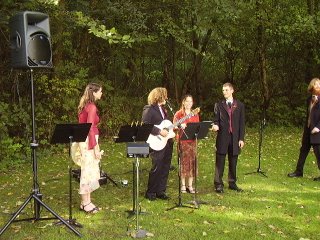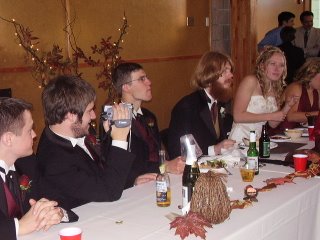Lynné and I (Youssef) are planning Thanksgiving to be a triplex-oriented event. I cannot remember who extended the invitation, the tenants or landlords, but I know that whoever received it embraced it. We will cook turkey together, play Monopoly together, and perhaps the following day observe the shopping madness together. What fascinates me is how communal the idea is. It might not observe some of the traditional boundaries--family first, 'over the river and through the woods'-- but it at the same time institutes something that might not have existed prior. Heart and hearth.
Now, I'm observing a church that may be having growing pains. (I say "may" because I don't know since I'm not a veteran member.) The inspiring talk referred to the command to love thy neighbor, and how "forbearance is not love - although forbearance comes from God's mercy." The struggle in the church comes from the implimentation of the idea that you don't want to simply be spiritual on Sunday. The idea includes such things as "We must remain believers in every aspect of our lives. It is in this way that the light within us draws non-believers to us." Include in that, too, the line "I preach the gospel all day long--and I only sometimes use words."
Here are my thoughts, synthesized from the two events outlined above.
- I can believe we are called to be Christians in all areas of our lives. It would be very difficult to convince me otherwise.
- Christians realize their faith through worship, fellowship, and discipleship with other believers. Even Bonhoffer, who described in "Living Together" the non-essentiality of Christian fellowship, recognized the luxury and the benefits of Christians being a part of a church. The Church, I am asserting, is an essential part of the Christian's life. Not only do we share in Christ's light burden, we are part of Christ's body.
- There is a paradoxical trend happening in my present days. The first half is towards distancing. Reference urban sprawl, reference children leaving their homes at 17 or 16 to live with roommates, reference the unknown impetus behind American children to disassociate themselves from their families as quickly as possible. The second half is towards connectivity. Cellphones, transit systems, the perseverance of the automobile (despite its fuel costs), and the believe in a "smaller world" all contribute towards that sense of connectivity. Now, I believe these two "movements," if I can use that term loosely to describe something without plans, I believe these two movements happen in conjunction. They are related in the same way that a dog-on-a-leash's distance from its grounding peg is related to the tautness of the rope.
- If we are called to be Christians in all areas of our lives, and being a Christian entails being a church-member, then we are called to be churchmembers in all areas of our lives. That sentence sounds a little silly, (and I wrote it hopefully so that I avoid the logical fallacy of "post hoc proctor hoc.") but I'm thinking about all of the things that come with being a churchmember: the doctrinal statements (I kinda have to say that), the most recent Biblical assertions (that is an observation, not an experience of mine), even the Church's identity... "We meet in a house." "We have an excellent worship team." "I sign for our congregation." "Our church is upgrading buildings." "We're orchestrating a ban of Harry Potter books." These are some base examples.
- The commandment of "Love thy neighbor" has not been interpreted to mean exclusively non-believers, last I heard. "Thy neighbor" could be sitting in the pew next to you, not just the guy who lives beside you. Yet we are called to love both of them, showing them the deepest kinds of love: "that which gives its life for his friend."
- I am leading to a point. Just let me get there...
- The paradoxical trend I outlined above has the effect of superficializing and compartmentalizing relationships. Both of those "-izings" are contradictory to the Christian ideas I outlined earlier: That Christian-hood should spread to all areas of one's life and that loving one's neighbor means giving one's life to save one's friend. Let me say that again, but in a different way. Superficializing a relationship is opposed to developing a love for a friend, a friend whom you would die to save. Compartmentalizing your relationships contradicts the Holy Spirit's goal of spreading the yeast of the gospel through one's life.
- Knowing two things about one's velocity (a: that you are heading south, b: that you are wanting to go north) should inspire some form of action, like turning around.
- We can conceive of opposites to the two sides of the paradoxical trend. First, a culture could exist that teaches the necessity of other community members. That culture would believe that one's youth and one's assent and one's age need not be spent in different places. The other opposite is that a culture could exist that believes in face-to-face communication. This culture could believe that men grow together when they participate together... as iron sharpens iron, one might say.
- I've tipped my hand with that last phrase. The cultures I described are one and the same as the Christian culture. Not just the apparent Christian sub-culture we have. I've described the Christian culture that we read about in the letters of Paul and Peter and that we envision when we say we want to go to church.
- ... oh, I'm tired of the bullet points. I believed at one point that the bullet points would help people organize my words as they read them. Maybe that's so, but I'm so sick and tired of having to mince my words so that the average reader could pick apart and understand my ideas. No more, I write. Here, at this point, my form has broken down because I am tired. I will nap soon.
We should choose to live near our church and its congregation. If we Christians truly want to attract people's interest in what has changed our lives, then we should try to live our lives together, allowing the open invitation. What I believe we will find by creating a spatial community of believers is that people will be drawn simply by virtue of the "in-crowd" principle. Imagine that snotty group in high school, the cool people, who would not let you in.. but you so badly wanted in. What if that group had been excited about letting you in, showed you the secrets to their happiness and success? The key of deep relationships lies in the Trinity, says John Eldridge in
Wild at Heart. The Trinity wanted man to join its perfect harmony, not because something was missing, but because perfect harmony welcomes and desires others to join its peace.
I conclude this unpolished post with my poorly paraphrased bit of Scripture. Jesus came so that we could live a more abundant life.


























 pictures taken at that time), and then we got to see the marriage of Joel and Heather!
pictures taken at that time), and then we got to see the marriage of Joel and Heather!





























 groom...
groom... 



 then on Monday we drove to Mt Rainier
then on Monday we drove to Mt Rainier 




